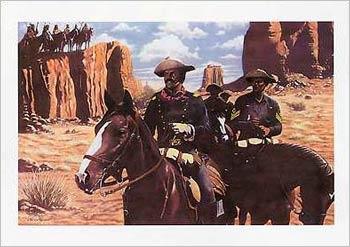Although the Turtle Mountain Indian Reservation is known as home to the Turtle Mountain Band of Chippewa Indians, there are also members of the Pembina Band of Chippewa living there.
Most of the Chippewa in this area are of mixed ancestry, predominately French and are known as Mechif/Metis. Few full blood Chippewas remain.
According to the 1990 Bureau of Indian Affairs estimates, tribal membership is approximately 25,000.

Encounter At Apache Wells L/e
Buy This Art Print At AllPosters.com
Find out how you can use this image for FREE.
RESERVATION LOCATION
The Turtle Mountain Service Unit is located in north central North Dakota, with Canada bordering the north. The service unit is comprised of Rolette County and covers approximately 938 square miles. The Reservation proper is totally within Rolette county and is only 72 square miles. Belcourt, the site of the Indian Health Service (IHS) hospital, is located 271 >miles from the Aberdeen Area Office.
RESERVATION ACCESS
The service unit is served by highways, U.S.
281, ND 5, and ND 3. Although paved, the highways are often
treacherous during the winter months due to snow and icy conditions. The Tribal Government and Bureau of Indian Affairs (BIA) hard-surfaced the major Tribal roads on the reservation. Freight service is provided by the Burlington Northern Railroad to Rolla seven (7) miles from Belcourt. Amtrak service is available at Rugby, ND, forty-five (45) miles from Belcourt. Air travel is provided by Rolla Flying Service, a private enterprise located in Rolla. Commercial air travel is available at Devils Lake and Minot (100 miles away), Fargo (250 miles away), Grand Forks (170 miles away), and Bismarck (280 miles away).
TOPOGRAPHY AND CLIMATE
The topography of the reservation consists of low rolling hills, trees, and brush of which 40% is covered with lakes, small ponds, and sloughs. Six-thousand acres are used for farming and the remainder is individually owned. The climate of the area is cold winters, with snow remaining on the ground for about six months and pleasant summers, warm in the daytime and cool in the evening. Average annual precipitation is between 25-30 inches.
HOUSING AND PUBLIC FACILITIES
Overcrowded housing conditions are slowly getting relieved by the various housing programs on the reservation with resources coming from HUD, FHA, BIA, and IHS. However, there is still a problem of substandard housing on the Turtle Mountain Reservation. Low-rent housing is available in Dunseith and the rural area north of Dunseith. Two low-rent complexes provide housing in the rural Belcourt area. Scattered home sites exist throughout the area. Belcourt is the site of government housing for BIA and IHS employees.
SOCIAL AND POLITICAL PROFILE
Although the service unit is known as home to the Turtle Mountain Band of Chippewa, there a also members of the Pembina Band of Chippewa living there. Most of the Chippewa in the service unit are of mixed ancestry, predominately French and are known as Mechif/Metis. Few full blood Chippewas remain.
According to the 1990 Bureau of Indian Affairs estimates, Tribal membership is approximately 25,000. The Tribe is governed by an elected Tribal council made up of nine members.
The Tribe has not developed sufficient information regarding surface and groundwater at the reservation to determine the quality or quantity of tribal water resources.